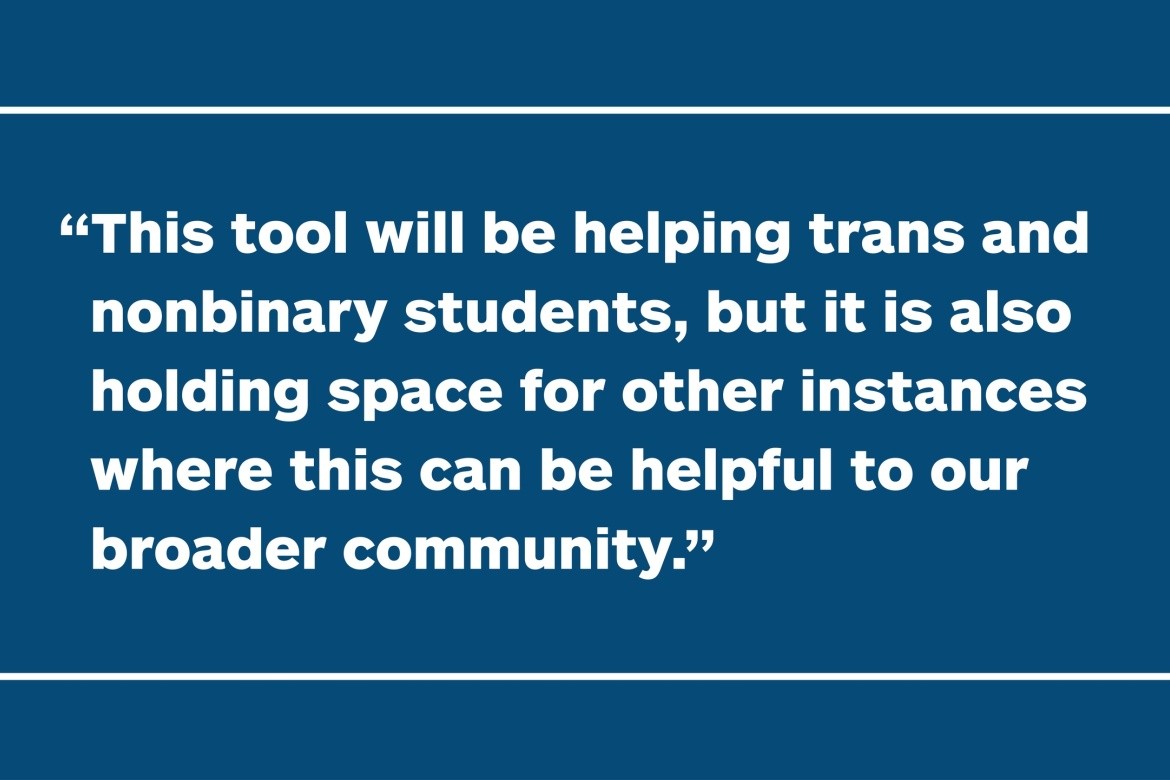Names are a matter of equity and inclusion

Mount Holyoke rolls out a chosen-name policy to enable community members to self-select their names.
By Keely Sexton
[This story has been updated 10/20/2021]
More than a year after Mount Holyoke unveiled its chosen-name policy that enables community members to change their first names in the College’s many computer systems, many community members have seized the opportunity to be called by the name that best suits them. Implementing the name-change policy was the culmination of a two-year effort led primarily by the Office of Diversity, Equity and Inclusion with enormous help from Library and Information Technology Services, known as LITS.
Kijua Sanders-McMurtry, the vice president for equity and inclusion at Mount Holyoke College, says that the move is a huge step toward delivering on Mount Holyoke’s promise of equity and inclusion for all.
“We are a women’s college that is gender diverse and our collective effort to champion diversity, equity and inclusion are ongoing,” Sanders-McMurtry said in a recent letter to the campus. “We welcome the opportunity to be in dialogue with so many members of the community as we strive to create a more just community in which every member is valued and thrives.”
Mount Holyoke students were integral to the creation and adoption of the new policy.
“When a trans person is deadnamed [referred to by birth name] or misgendered it does real harm,” said Kai Chuckas ’20, who dedicated himself to the chosen name policy work as a fellow in the diversity, equity and inclusion office. Chuckas recalled being deadnamed and misgendered when visiting a department — simply because their computer systems did not reflect his chosen name. “It can trigger sadness, it can trigger pain. It can trigger a lot of very negative emotions associated with gender dysphoria.”
In the summer of 2018, Chuckas was part of a group of individuals comprising staff from LITS and the diversity office who reviewed the multitude of places where names show up system wide so they could be integrated. The goal: a single point of change where a community member could enter their information, which would then disseminate across the dozens of systems that work behind the scenes to keep the College running — from professors’ roster sheets to library cards to the health care center.
A long time in the making
It was 2014 when then-President Lynn Pasquerella ’80 famously announced that Mount Holyoke, a women’s college, would be accepting all students across the gender spectrum, except for cisgender men. The policy marked a bold shift in understanding the mission of a women’s college: No longer strictly bound by a historic understanding of the word “women,” Mount Holyoke became the first of the nation’s best-known women’s colleges, the Seven Sisters, to adopt a policy that explicitly included all trans and nonbinary students.
At the time, the policy was not accompanied by the infrastructural changes that the trans and nonbinary community needed to fully integrate into the College. It was one of the first challenges that Sanders-McMurtry, who is also the College’s chief diversity officer, wanted to address when she joined Mount Holyoke in 2018. The College’s Administrative Technology Steering Committee approached her with a draft policy that had been in the works prior to her arrival.
“There are so many systems involved,” said Chuckas. “It’s any place a name would show up, like FAFSA [the federal financial aid form], W-2 forms, library checkout, the name that appears when you’re in the health center — all of those are attached to different systems and we had to figure out how to change them and make them talk to each other.”
The team found a partner in LITS, which began re-coding and re-organizing the systems to make changing names and pronouns within the system as easy and seamless as possible in order to provide a more integrated experience for the entire Mount Holyoke community.
The result is a seamless one-stop-shop for name changes across Mount Holyoke’s various systems.
“This tool will be helping trans and nonbinary students, but it is also holding space for other instances where this can be helpful to our broader community,” said Percy Child ’21, who worked with LITS and the diversity, equity and inclusion office to help integrate the systems.
Enabling the Mount Holyoke community to set and change their own names is an accomplishment that will meaningfully improve the lives of all community members who wish to use it, but it’s just the beginning. Both Child and Chuckas see this as a step in a journey toward becoming a more inclusive institution — and making an example for others to follow.
“Other gender-diverse women’s colleges do look to Mount Holyoke for guidance on how to roll out policies like this and I do hope that us doing this will lead to other institutions following suit,” said Child. “I would definitely say that this is a step in the right direction and does reveal a commitment to moving forward with stuff like this."